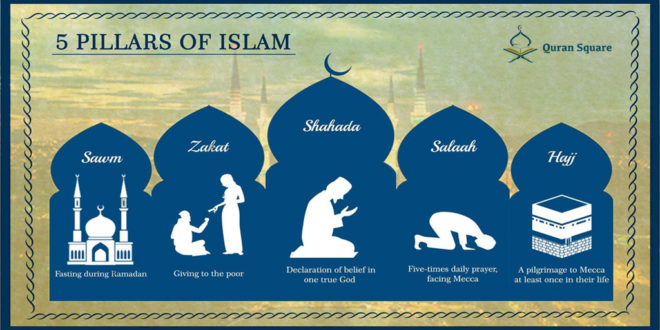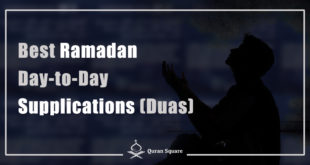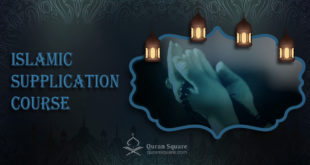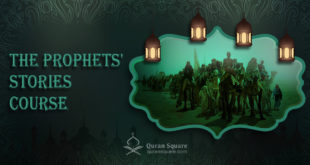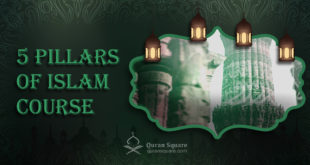What are the 5 Pillars of Islam?
The 5 Pillars of Islam are the foundations of Islam and represent the core of Islamic practice. One who believes and practices upon these pillars is the true Muslim.
In Islam, it’s important for every Muslim to Learn The 5 Pillars of Islam. Through this article, we’ll get to know the main five obligations of a Muslim in Islam.
1. The Shahadah (The Declaration of Faith)

The Shahadah (The Declaration of Faith) is the first and most important pillar of Islam. It’s the initial submission to Islam and carried out by those reverts to Islam as a commitment and declaration of their faith.
The shahada is a two-part statement that articulates the main beliefs of Islam.
The first part of Shahada states that there is no god but Allah (SWT) which means that no other being has the right to be worshiped and that Allah almighty has neither partner nor son.
The second part of the Shahada witnesses that our beloved prophet Muhammad (PBUH) is the last prophet & messenger sent by Allah (SWT).
“I testify that there is no god but Allah (SWT), and Muhammad is the Messenger of Allah (SWT)”
The Shahadah statement in English
أشھد ان لا الہ الا اللہ, وأشھد ان محمد رسول اللہ
The Shahadah statement in Arabic
The Shahada should be recited three times with full and pure conviction to declare submission to Islam.
2. Salah (Daily Prayer)

“Salah” or “Salat” is the second pillar of Isalm and represents the backbone of Islam’s belief due to its importance and greatness.
In Islam, there are five obligatory daily prayers in which Muslims must perform in certain ways and times. The times for each prayer vary according to the lunar calendar as they range from sunrise to midnight. To perform Prayer correctly, Muslims should follow the method commanded by Allah in the Qur’an and the prophet’s manners in performing.
The 5 mandatory Muslim prayers are:
- Salat al-fajr: dawn, before sunrise
- Salat al-zuhr: midday, after the sun passes its highest
- Salat al-‘asr: the late part of the afternoon
- Salat al-maghrib: just after sunset
- Salat al-‘isha: between sunset and midnight
During these prayers, Muslims face Mecca, which is the location of the Kaaba, the most sacred site in Islam. Each prayer includes a recitation of Quran, along with different Ruko.
Prior to each prayer, Muslims must perform a washing ritual in which called “Wudu“(Ablution) to ensure purity prior to standing before Allah (SWT).
At prescribed times of the day, the adhan/adhaan/Azaan (call to prayer) announces the set time for the prayers. It’s usually recited at Mosques, but can also be recited at home at the exact time prior to performing the daily prayer.
Through the daily prayers, a Muslim maintains his relationship with Allah (SWT), cleanse heart & souls, comes to remember Allah (SWT) often, and avoids falling into sins.
3. Zakat (Almsgiving/Charity)

“Zakat” or Alms-giving is the third pillar of Islam and it is mandatory on every Muslim who is financially capable.
A financially capable Muslim must donate a percentage of his/her yearly income or fortune equal to 2.5% every year to the poor and needy.
The main idea of Zakat is that Allah (SWT) has intentionally created different levels of wealth for each individual to test humanity and generosity among Muslims.
Zakat generates a sense of devotion and worship to Allah, sympathy with poor, needy, destitute. It also purifies the hearts of both poor and rich, achieves social justice, and creates a cooperative, cohesive, productive society.
Moreover, It’s important to acknowledge that nothing we acquire in this world is truly ours; nothing that we have will be buried with us, nor will it be used in our Hereafter. Only our good deeds and those who we helped will help us enter Jannah (Heaven) in our Hereafter.
In regards to Zakat, Allah (SWT) says in the Holy Quran:
Take, [O, Muhammad], from their wealth a charity by which you purify them and cause them to increase, and invoke [ Allah ‘s blessings] upon them. Indeed, your invocations are reassurance for them. And Allah is Hearing and Knowing.
Quran [9:103]
Also, our beloved prophet Muhammad (PBUH) says in the importance & benefits of Zakat:
Allah has made zakat obligatory simply to purify your remaining property.
Sunan Abi Dawud 1664
4. Sawm (Fasting during Ramadan)

“Sawm” or Fasting is the fourth pillar of Islam in which Muslims fast during the daylight hours in the holy month of Ramadan, the 9th month of the Islamic calendar.
Fasting during Ramadan involves discipline and abstaining from many things, such as food, drink (including water), medication, any acts of evil, any sexual activity, backbiting, harming oneself or others, smoking, impure thoughts, etc.
Fasting is a special kind of worship that has a great unique reward from Allah (SWT). It has a lot of spiritual, moral, and physical benefits. In a narration by Al-Bukhari, the Messenger of Allah (PBUH) said:
Allah (SWT) says: “The reward of observing Saum is different from the reward of other good deeds; Saum is for Me, and I Alone will give its reward.”
[Al-Bukhari and Muslim] | Book 9, Hadith 225
The key objective of fasting is to increase one’s piety and also to experience the pain and hunger that the poor and needy feel. It also purifies both body & soul.
Moreover, in the sacred month of Ramadan, Muslims use this special event to refocus their devotion to Islam by learning the Quran and read the entire Quran or perform extra prayers during the month. Allah (SWT) says in the Holy Quran:
O you who have believed, decreed upon you is fasting as it was decreed upon those before you that you may become righteous
Quran [2:183]
Certain individuals may be excused from fasting subject to their circumstances such as suffering from some disease requires taking medication, pregnant, underage, and so on.
5. Hajj (The Pilgrimage)

“Hajj” or Pilgrimage to the Holy Kabah in Mecca is the fifth and last pillar of Islam.
Hajj occurs annually and performed in the holy month of Dhul Hajj, the last month in the Islamic calendar. Hajj rituals are performed from 8th Zul-Ḥijjah to 12th Zul-Ḥijjah in Makah the city of Saudi Arabia.
It’s obligatory to every Muslim who is physically and financially able to afford the cost and difficulty of travel to visit the holy city of Mecca and make the rites of Hajj. Muslim has to perform this duty once in his/her entire life when healthy, an adult, and having enough money to go to Mecca and perform hajj without causing any harm to his/her family or putting them in financial distress. In this regards, Allah (SWT) says:
And [due] to Allah from the people is a pilgrimage to the House – for whoever is able to find thereto a way.
Quran [3:97]
Pilgrimage (Hajj) is a special pillar of Islam that involves unmatched rewards from Allah (SWT). The prophet Muhammad (PBUH) says:
Whoever performs pilgrimage to this House, and does not Yarfuth (utter any obscenity or commit sin), will go back as (on the day) his nother bore him.
Sunan an-Nasa’i 2627
The pilgrimage is carried out in plain white, identical clothing, also known as the ihram. One significance of the ihram is to promote unity in Islam and remind us that no matter what ethnicity, age, status, or race, we are all equal in the eyes of Allah (SWT).
We should know clearly that the five pillars of Islam are not merely for the purpose of worship but they aim to connect Muslims with their creator and understand what their religion really is.
 Quran Square Online Quran and Arabic Classes
Quran Square Online Quran and Arabic Classes

